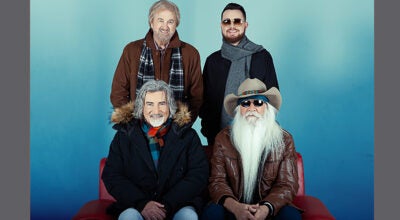PROFILE: Finding the right Spot
Published 10:31 am Monday, March 1, 2010
It’s something you probably never think about, until you need one. And then, you’re glad to spy those small hard plastic structures tucked discreetly along alleys just off a parade route or assembled in a row at the fairgrounds.
Johnny On The Spot. The product is an indispensable part of just about every local festival and fair. The company itself is a local success story, albeit one with humble beginnings.
In the beginning
Johnny On The Spot came into existence in 1958 when Ironton businessman Robert Slagel sold his chemical company, Slagel Chemical, to an outfit from Midland, Mich., (which was to become the present-day Dow Chemical) and was looking for something new to occupy his time.
A true entrepreneur, Slagel could see opportunity where others could not. He knew there was a need for portable toilets and he set about filling the need with a quality product.
Using a warehouse near Moulton Field in Ironton as his manufacturing center, Robert Slagel split a 55-gallon drum in half and mounted it on plywood with a plywood shell around it. For the time, his design was unique and modern — but at first was absolutely unappreciated.
“It was quite a feat in getting people to believe they needed to rent a place to go to the bathroom,” present-day Johnny On The Spot Co-owner Rob Slagel recalled hearing his grandfather say.
Undeterred, the older Slagel marketed his portable potty to people who perhaps needed them most: Construction workers — people who were building power plants and factories but had no immediate access to on-site restroom facilities. Before the advent of the portable potty, the standard fare for workers on construction sites was the 5-gallon bucket: Utilitarian maybe, but hardly private and definitely not sanitary. And then there was the odor and visual disgust of an open bucket of human waste.
Slagel’s first customer was American Electric Power. Handling sanitation for AEP took Slagel to that entity’s construction sites all over the eastern part of the United States. Seeing the benefits of better sanitation, other companies eventually followed suit. An entrepreneurial idea had taken wing.
A modern convenience
What was once a construction site anomaly over the years became a must-have and the idea of renting those on-the-spot restroom facilities began to develop merit not only among construction companies and factories but among organizers of community events as well. The first Robert Slagel started his outfit with one tanker truck and a fleet of 10 to 12 toilets. The wooden potties eventually gave way to the polyethylene models that were developed in the mid 1970s — the most common form of port-a-potty used today.
The Ironton business now has more than 850 toilets and more than 14 tankers. JOS now has 15 employees. In 52 years JOS has grown into a $3.5 million operation — an Ironton business that began in Ironton and stays firmly entrenched in Ironton. A local business success story.
Shawn Turley, office manager for the business, said Johnny On The Spot now has a standard clientele of a couple hundred enterprises not including all the special events, such as weddings, parties and other one-time customers. The portable potties are now standard though discreet sights at the Ironton-Lawrence County Memorial Day Parade, Ironton’s Gus Macker, Oktoberfest and Rally On The River, the Lawrence County Junior Fair and any number of other community events large and small.
“We do a majority of the special events in the Tri-State and (service) a large portion of the industry and construction here,” Turley said.
An even newer idea
While the polyethylene chemical-based portable toilet is a leap over the old wooden ones, JOS now offers a portable unit that is far more than just a plastic potty and light years ahead of the 5-gallon bucket.
For outfits that need long-term service, JOS now offers 20-feet-long and 40-feet-long units with electricity, hot and cold running water, flushable toilets, showers and heating and air conditioning systems. The new units have a 2,100-gallon clean water reservoir and a 2,100 sewage holding capacity.
“Hygiene has come a long way since my grandfather started in 1958,” Slagel said. And that’s a good thing, especially for those construction workers who put in a long days’ work and deserve at least the bare necessities. These guys aren’t animals. They need to be treated with respect.”
The company built $1 million worth of the new high-tech units last year alone.
Slagel said JOS has been building the new units three years and has sold them all over the country.
“Building trades love them,” Slagel said. “Marathon, AK Steel, AEP, the building trades guys love them. They want running water on a job site as opposed to a chemical can when its two degrees outside. They use this as a way of attracting top quality labor.”
Along with the restrooms, JOS can now provide decontamination units, security checkpoints and portable clothes washing and drying facilities.
The Slagel knack for turning brilliant ideas into successful business reality continues with the addition of two other enterprises in recent years: Storage On The Spot, a temporary storage unit rental business, and Modular Security Systems, Inc., which offers portable, high-tech, high-security office systems to construction sites and factories. MSSI has a Fortune 500 clientele and has units in service all over the world. All of these enterprises are growing steadily. All of them are based in Ironton.
Lessons learned
The first Robert Slagel later handed the business to his son, John, Rob’s father. Rob Slagel joined the family business in 1999. His brother, Dave joined in 2004.
Over the years, some truths about business filtered down through the generations and the years, nuggets of wisdom about hard work, success and finding and filling a niche.
The elder Robert Slagel was in his 50s when he started JOS — proving age has nothing to do with productivity. Even after he handed JOS to his son, Robert Slagel and his brother started another business and yes, it was successful.
Another truth: Know your customer and be ready to meet their needs.
“Don’t try to force an idea down your customer’s throat,” Slagel said. “Listen to them. They know what they need. You need to be open-minded enough to build it for them.”




